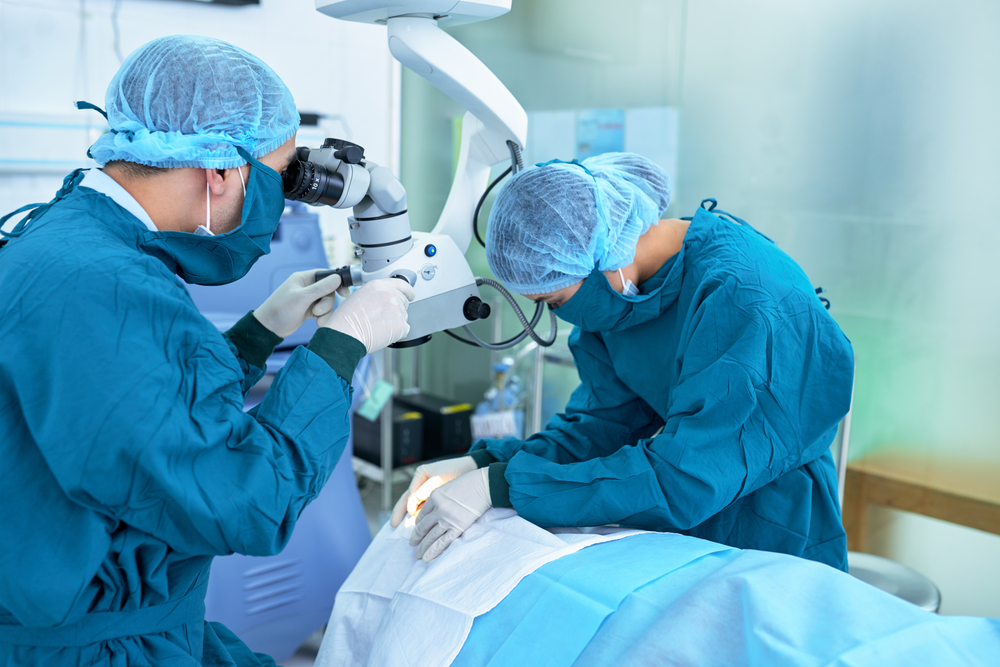Often referred to as the “silent thief of sight,” glaucoma is one of the leading causes of blindness in Americans over the age of sixty. It is often asymptomatic in its earliest stages, meaning that a person’s vision may have already been impaired in some way before they are even properly diagnosed!
Keep reading to learn more about glaucoma, including how eye doctors can treat this condition!

What is Glaucoma?
Glaucoma is an eye condition that occurs when fluid in the eye, known as aqueous humor, does not drain properly. As this fluid collects, it causes increasing pressure inside the eye, damaging the optic nerve.
If left untreated, glaucoma can cause vision impairment, from blind spots in your vision to the complete loss of your vision. Blind spots are an early indicator of glaucoma, though often, by the time blind spots are noticed, serious damage to your optic nerve fibers has already occurred.
What are the Types of Glaucoma?
There are two important types of glaucoma to know: primary open-angle glaucoma and angle-closure glaucoma. Angle-closure glaucoma is sometimes called either closed-angle glaucoma or narrow-angle glaucoma.
Primary open-angle glaucoma is the most commonly diagnosed type of glaucoma. This type of glaucoma happens gradually, as the eye stops draining intraocular fluid as well as it should, causing increasing pressure within the eye.
Open-angle glaucoma is painless and usually does not cause immediate vision changes. The second type of glaucoma, angle-closure glaucoma, occurs when the eye drainage area is blocked by the iris, trapping fluid at the front of the eye and resulting in a rapid buildup of pressure.
People with angle-closure glaucoma are often unaware they have this eye condition until they experience an “acute attack,” which is the sudden onset of angle-closure glaucoma symptoms. There are many other types of glaucoma, as well.
What are the Symptoms of Glaucoma?

The symptoms of open-angle glaucoma and angle-closure are quite different in the way they present themselves. While the symptoms of open-angle glaucoma usually develop over time, the symptoms of angle-closure glaucoma appear suddenly, seemingly out of the blue.
Common symptoms of open-angle glaucoma include:
- Vision impairment in peripheral vision
- Tunnel vision
- Elevated intraocular pressure
- Blurred vision
- Halos around lights
- Sensitivity to bright light
The symptoms of an acute attack of angle-closure glaucoma can include severe eye pain, blurred vision, headache, nausea, and redness of the eye. If you experience a sudden onset of the symptoms of angle-closure glaucoma, it is a true eye emergency, and you should seek immediate medical attention.
What are the Risk Factors for Glaucoma?
While anyone can be diagnosed with glaucoma, you may be at a higher risk for developing glaucoma if any of these factors apply to you:
- You are over the age of forty
- You have a family history of glaucoma
- You have abnormally high intraocular pressure
- You are of African, Hispanic, or Asian descent
- You have certain eye conditions or chronic diseases, including myopia, a previous eye injury, thin corneas, diabetes, migraine headaches, and hyperthyroidism
How is Glaucoma Treated?
Because there is no cure for glaucoma, the primary goals of glaucoma treatment are to reduce pressure within the eye, minimize damage to the optic nerve, and prevent further loss of vision.
These are the most common treatments eye doctors use to treat glaucoma:
Medication
The first treatment option an eye doctor may prescribe are special medicated eye drops or oral medications, both of which aim to reduce eye pressure. Depending on your individual diagnosis, these eye drops can include prostaglandin analogs, beta-blockers, alpha agonists and carbonic anhydrase inhibitors.

Laser Therapy
There are several types of laser therapies that can be used to treat glaucoma. They include laser trabeculoplasty, which helps improve drainage of the aqueous humor; laser peripheral iridotomy, which creates a small hole in the iris to promote better drainage; and cyclophotocoagulation, which is a procedure that reduces the production of aqueous humor.
Glaucoma Surgery
In cases where neither medication nor laser therapy is successful in sufficiently controlling glaucoma, a surgical procedure may be necessary. Surgeries to treat glaucoma include a trabeculectomy, in which a new drainage channel for the aqueous humor is created, and aqueous shunt implantation, where tiny devices called shunts are implanted in the eye to facilitate drainage.
Treatments for glaucoma are more likely to be successful when glaucoma is diagnosed in its earlier stages. Since the symptoms of glaucoma develop slowly and can be unnoticeable at first, it is important to schedule yearly comprehensive eye exams, particularly if you have a higher risk of developing the condition.
Can Glaucoma Be Prevented?
Though developing glaucoma is not preventable, there are some things you can do to potentially slow its progression. Some of the best prevention methods are scheduling regular comprehensive eye exams, knowing your risk factors, avoiding smoking or quitting if you do smoke, and following your doctor’s orders to manage any chronic health conditions you may have.
Glaucoma is a very serious eye condition that, left undiagnosed and untreated, can lead to total loss of vision. The best way to protect your precious eyesight if you have been diagnosed with glaucoma is to seek a knowledgeable and experienced eye care provider like Nevada Eye Physicians.
Our team can offer you the most advanced glaucoma treatments available today to help maintain the quality and clarity of your vision after a glaucoma diagnosis.
Are you experiencing vision changes? Schedule an appointment at Nevada Eye Physicians in Las Vegas, NV, today!



